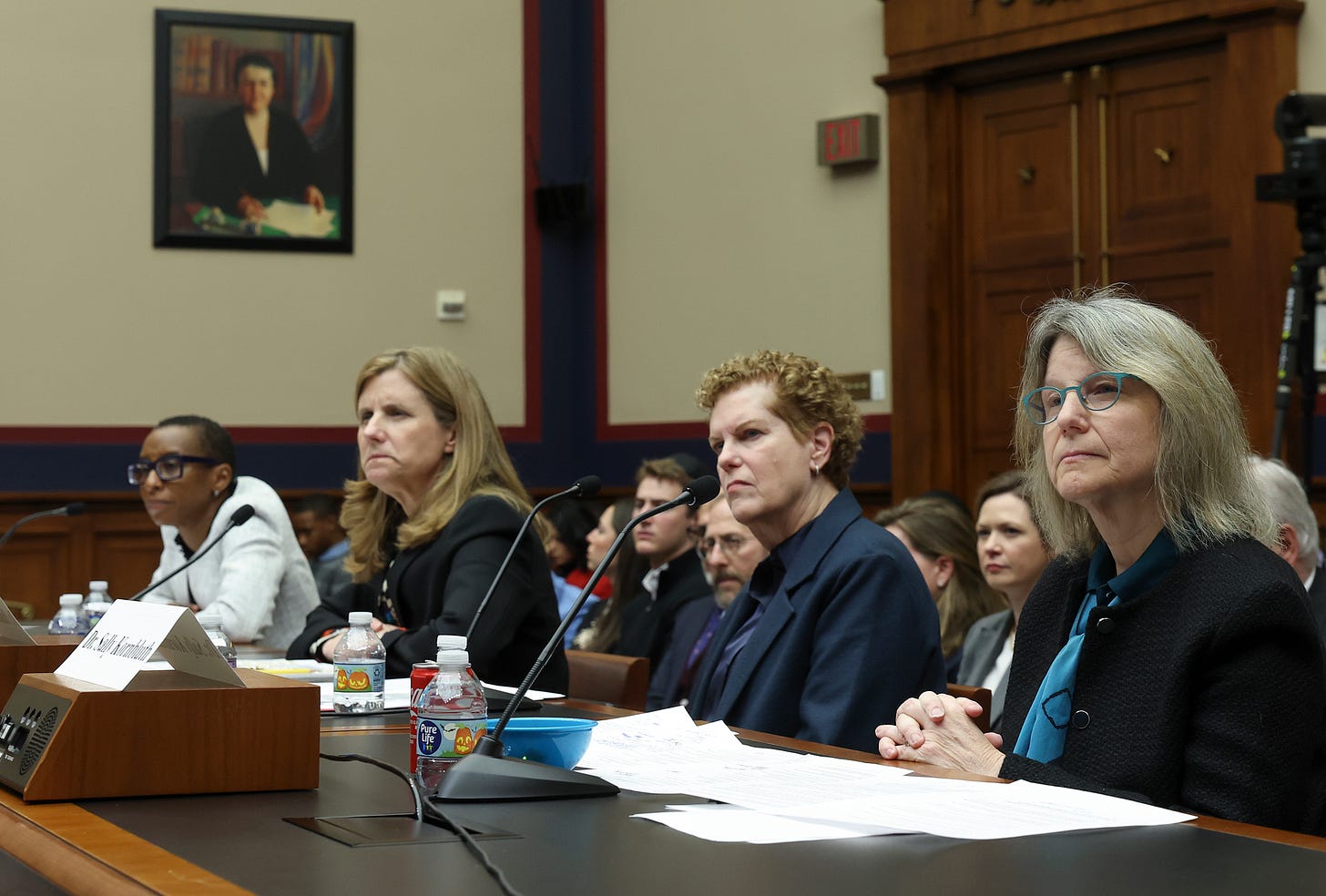The Day the Empress’ Clothes Fell Off
For his Substack The Weekly Dish, FAIR Advisor Andrew Sullivan writes about how the December 5th Congressional hearings on campus anti-semitism only underscored what many people already believe is the path to saving higher education:
End DEI in its entirety. Fire all the administrators whose only job is to enforce its toxic orthodoxy. Admit students on academic merit alone. Save standardized testing — which in fact helps minorities, and it’s “the best way to distinguish smart poor kids from stupid rich kids,” as Steven Pinker said this week. Restore grading so that it actually means something again. Expel students who shut or shout down speech or deplatform speakers. Pay no attention to the race or sex or orientation or gender identity of your students, and see them as free human beings with open minds. Treat them equally as individuals seeking to learn, if you can remember such a concept.
I’m Worried About the Boys, Too
For The Free Press, FAIR Advisor Jonathan Haidt examines the serious problems facing boys and men today.
Boys are in trouble. Many have withdrawn from the real world, where they could develop the skills needed to become competent, successful, and loving men. Instead, many have been lured into an ever more appealing virtual world in which desires for adventure and for sex can be satisfied, at least superficially, without doing anything that would prepare them for later success in work, love, and marriage.
What Is Happening at the Columbia School of Social Work?
For the New York Times, Pamela Paul writes about the ideological takeover of the Columbia School of Social Work.
Social work education has always been tied to social justice, said Amy Werman, who graduated from the Columbia School of Social Work in 1982 and has been teaching clinical and research courses there since 2009, full time since 2015.
But in the past few years, she said, the student body has become more radical. “Many students see themselves as social justice warriors, and protesting is the litmus test of being a real social worker,” she told me. She said she couldn’t remember a single protest at the school when she was a student. “Now,” she said, “I feel it’s a rite of passage.”
Three ways to diffuse the tension
For Braver Angels, frequent FAIR Substack contributor Julian Adorney shares his three ways to diffuse tension: 1) When you’re talking politics and things get heated, stay non-reactive, 2) Focus on the relationship, 3) Unplug from cable news and political fundraising emails.
I’m a libertarian, and I’ve spent my whole life surrounded by people who disagree with me politically. Most of these people (like me, when I was younger) live in something of a bubble, and are convinced that theirs is the only right and moral way to see the world. If you disagree, they think, you might be a bad person.
In spite of that, I’ve managed to keep and even deepen relationships with folks who were at various times tempted to cut me out of their life. I’ve even helped a few of them become less affectively polarized. Here’s what I’ve learned along the way.
The Universities That Don’t Understand Academic Freedom
For The Atlantic, “The Identity Trap” author Yascha Mounk gives his reaction to the December 5th Congressional hearings on campus anti-semitism.
Many people who were rightly horrified by the congressional hearings faulted Kornbluth, Magill, and Gay for refusing to say they would punish students for expressing this kind of abhorrent sentiment. But that is overly simple. In a narrow, technical sense, the three presidents were correct to state that their current policies would probably not penalize offensive political speech. In a more substantive sense, universities should defend a very broad definition of academic freedom, one that shields students and faculty members from punishment for expressing a political opinion, no matter how abhorrent.
The real problem was that none of these university leaders made a clear, coherent case for their institutions’ values. So when they did invoke academic freedom, they came across as insincere or hypocritical—an impression only reinforced by their record of failing to stand up for those on their campus who have come under fire for controversial speech in the past.
FAIR News Podcast
For audio versions of our FAIR News and FAIR Weekly Roundup newsletters, subscribe and listen to FAIR News Weekly on Apple Podcasts, Spotify, Google Podcasts, or via RSS feed.
Join the FAIR Community
Join us, and become a member of FAIR.
Become a FAIR volunteer, or join a FAIR chapter.
Take the Pro-Human Pledge and help promote a common culture based on fairness, understanding, and humanity.
Sign-up for a Welcome to FAIR Zoom information session to learn more about our mission.
Share your reviews and incident reports on our FAIR Transparency website.










Three out of five articles are behind a paywall (I could read the Atlantic article if I signed up for a free trial, but I don't want to think about cancelling it later).